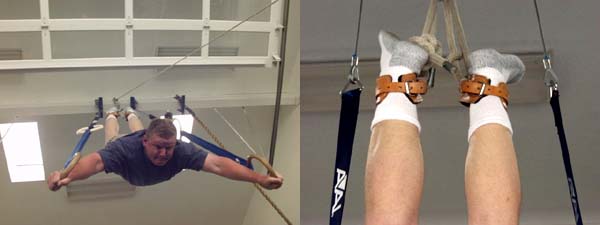workout of the day
Wednesday 030618
Complete 5 rounds of:
Deadlift twice bodyweight 10 reps
10 Handstand Push-ups
Touch nose to ground on handstand push-ups. Post time for completion for all five rounds in comments.

How do you get a 250-pound barbarian to do an “inverted cross” on the rings? With an ankle harness and block and tackle, that’s how. We use the ankle harness for handstand push-ups, “elevators”, planches, and inverted crosses and a harness for muscle-ups, dips, and the iron cross. Giving an athlete an assisted exposure to these staples of the still rings heightens the athlete’s kinesthetic sense, is still extremely demanding, and renders a heightened appreciation of gymnastics skills.
Many gymnastics movements demand motor recruitment patterns completely foreign to other athletes’ experience. For instance, the iron cross demands a rather potent co-contraction of the lats and pecs – muscles that regularly function as antagonists in most weight training exercises. As another example, the presses to handstand shift the load on body extension from the lumbar spine to the thoracic spine dramatically shifting both leverage and proprioception from familiar weight training exercises.
We’ve seen Olympic athletes that struggle discerning up from down and left from right when suspended upside down; it doesn’t take much gymnastics training to improve these athlete’s spatial orientation.